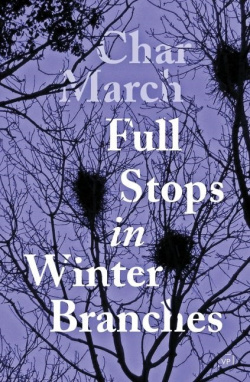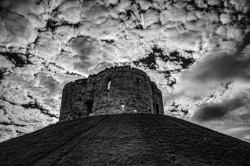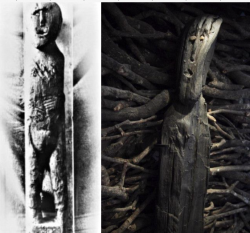My kind of poetry: Char March

This will be the third, and for a time, the last of my northwords poetry posts. It comes with a kind of synergy or symmetry, in that while last week’s poet, David Underdown, travelled north from Manchester to Arran, and latterly south to Hebden Bridge, this week’s guest poet, Char March, began life in Scotland, lived all over everywhere, settled in Hebden Bridge, but recently moved away and now lives in Loughborough.
In the last two posts I’ve mused about what I think of as the markers of northwords and of northern poetic voices: heft, texture, a consonantal musicality; an emotional openness; expansiveness. To this I’ll add one more thing – exuberance- which I think is the hallmark of Char March’s work.
It’s high time to meet her.
Char March is a multi-award-winning poet, short fiction writer, playwright and screenwriter. She loves performing her poetry, and she’s passionate about helping people find their own voice. She is a highly-skilled editor, writing tutor, mentor and coach. She works with organisations to boost their creativity, and to release the potential of their staff. She has five poetry collections, the latest being Full Stops In Winter Branches; a short story collection, six BBC Radio 4 plays, eight stage plays, and two screenplays. She’s been writer-in-residence for hospitals, art galleries, landscape projects, international business schools, Temple Newsam mansion, Ty Newydd, and the NHS. She’s lectured in creative writing at universities across the UK, in Canada, Australia and Europe. She’s an environmental sciences graduate, has been a Hawthornden Fellow twice, and recently (another bit of synergy) won the prestigious McLellan poetry prize which is organised by last week’s guest. Two endorsements should give you a flavour of what to expect:
From Ian Duhig: “Char is a highly entertaining and genuinely original voice. Her carefully crafted poetry patterns together to produce salt, lemon and tequila.”
and from Philip Gross: “Char March delights in the hidden strengths of words, her poems have a healthy toughness at their heart – the ability to surprise the reader with a candour that forces us not just to feel but also to think.”

Given the title, we’ll start with a poem about a linguistic pedant.
An enthusiasm
It got wearing when every menu
had to be corrected before we could eat.
When you began to carry permanent markers
– in six colours – in every handbag.
When I took you for rambles, and signposts,
farm produce boards, interpretation leaflets
all had to be axed of excess apostrophes, split
infinitives, eccentric spelling.
When you’d rant for hours on the phone
to Hong Kong, Poland and Mumbai
over imperfect instructions for your hoover,
flat-pack bedside table, packet of crisps.
Aunt Patricia nearly went through the windscreen
when you threw on the anchors on the M62,
then ran across all four lanes to draw a semi-colon
on that roadworks sign.
You sent corrected letters (furious with red ink)
back to MPs, Yorkshire Water, our children.
You stalked the length of every train, bifocals
cocked at each and every notice.
You made the guard reword his announcements,
and practice – three times – over the tannoy.
You bought sticker sheets of punctuation,
sent the grandchildren off with bunches
of commas, en-dashes, question marks.
You bought pallet-loads of Eats, Shoots & Leaves,
handed them out evangelically at the WI, yoga,
outside Sainsbury’s, and to every teacher you met.
I got my revenge on your gravestone.
It doesn’t need much of a commentary, does it? It’s not damning with faint praise to hear it as a great open mic poem. But just see how deftly it opens ... what’s going to be “so wearing”? I think the hook’s right there in the opening couplet, and after that it takes off in gleeful excess, right up to the point when, because of the single last line, you realise you need to hold it a beat for the punchline. I like the way we’re left to fill in the gap, to write our own version of that gravestone. It’s great storytelling, it’s crafted, it’s economical. It works. There’s entertainment for you. Against this, I want to share the next poem to highlight another side of Char’s work which has to do with social empathy (which the world is sorely in need of). The title came from something overheard on a BBC Radio Leeds phone-in about people sleeping rough in the city.
They just use dogs to get more dosh

– it shouldn’t be allowed
This is my person
dHe sleeps beside me
I’ve had him for two years,
found him in a Waitrose car park
I brought him some newspapers
My person likes newspapers – and cardboard
He gave me a cream cake from the bin
He tied himself to me with this string
This is our home
It glitters with smells
It is best in winter
Then the metal tubes blow hot air
In summer it is cars’ barks
And there are loud people
They come and kick my person
They try to kick me
Sometimes he is sick
I eat his sick
Then I take him to the big place that echoes
They give him a hot bowl
They give me crunchy bits and a stroke
Then they scare my person with pieces of paper
He takes his cardboard
He takes my blanket
I lead him back home
It seems simple enough, apart from its tenderness, and it could seem sentimental, to use the voice of the dog, but there’s a moment that draws you in, and lifts the poem out of the ordinary. “This is our home /It glitters with smells.” Helen Mort noted how this is one of those examples of how Char March “attends to the world”, how she can net the “colour of energy”.
A much darker poem now. On March 16 1190 a wave of anti-semitic riots culminated in the massacre of an estimated 150 Jews – the entire Jewish community of York – that had taken refuge in the royal castle where Clifford’s Tower now stands. Seeing no way out to safety most of the Jews chose to commit suicide in the keep. The alternatives were to renounce their faith and surrender to forced baptism or death at the hands of the mob. They were led by the wealthy Jew Josce and Rabbi Yomtob, a noted scholar, who had come to York from Joigny in France. After killing their wives and children they set fire to the wooden keep and killed themselves.
Pogrom – Clifford’s Tower, York

Thon driftin’ ’aze of roast pork, I tell thee,
it meks me paunch talk. A single ’ot pie since daybreak,
an’ nowt since – through all thon ’ectic trammellin’
up an’ down’t cobbled ginnels. I allus knowed
as ’ow them weren’t true men – snufflin’ like sows.
But their women! Gods didn’t they screech an’ ’owl!
See? One of them even bit us! An’ run! I’d allus ’eard
they was that fat as ’ow them could ’ardly waddle.
An’ then this gurt long wait after all’t fun. Wi’ me belly
growlin’ an’ carryin’ on. An’ bloody crowd swellin’ like a boil.
All’t sweat done by us few. I just want a bit of summat
for me trouble – for doin’ me civic duty.
But there were nowt there. Paintin’s, posh tapestries,
but bugger all tha’d want. We’d ’eard their cellars
was groanin’ wi’ gold, secret siller, an’ rubies big
as noses. Likely! Nivver even a kindly cask of ale.
They must ’ave tekken it wi’ ’em, an’ The Good Lord knows
as ’ow tha can’t do that – specially not them lot.
I loved t’tower all lit an’ belchin’.
A ’uge chimbley – all leapin’ flame. All a-spit
an’ a-crackle wi’ their fat bones.
Uuuuuurp! Oh – pardon me. It’s me belly.
Nivver right wi’ nowt in it. An’ all on us below,
a sea of Ooooooos! an’ Ahhhhhhs! Flickerin’ ’ot faces.
All grinnin’ up at t’shafts of sparks an’ thon grand smell.
By, I could murder a pie. Tha’d think as ’ow
some bugger’d ’ave nous to come round all on us
wi’ some pies, some grog, summat – city of bloody merchants!
For none on us’ll move, not till it’s cooled enough
to get near wi’ rakes an’ sieves an’ bare bloody ’ands!
Sift thro’ their ashes, ferret out all’t fused coin, all’t
gobs of gold an’ globs of bracelets what they’ve thieved off us.
Money-grubbin’ ’eathen. Ouf! We’re off!
By, it’s a gradely press – canst smell our goodly sweat?
’Ere! Thon bastard tower is still ’urling red-’ot
boulders down on us – whose bloody side is it on?
This is a poem with an ear for a fully imagined, created character. There’s the “carefully crafted” work Ian Duhig remarked on. The dialect and its accent is properly nailed down; Char March is showing us her dramatist’s credentials here, and to some purpose. Which is to uncover the dark heart of mob violence. It might be set in the 12th century, but it’s dreadfully of the moment. We’re living in one of the sleeps of reason which breeds monsters, like this brutal citizen who doesn’t know he’s a monster. He’s simply joining in the fun, one of a “bloody crowd swellin’ like a boil”. This is just ‘one of us’, whose main concern, if he’s capable of concern, is that “One of them even bit us!”. If he has any emotion it boils down to righteous indignation; he believes even his sweat is “goodly”. I grew up with this accent, and also with the words of the guildsmen in the York Miracle Plays. This poem is in that tradition, and its horror lies in the fact that the voice (in the words of Tony Harrison) is
one of those / Shakespeare gives the comic bits to: prose
Here’s the ancestor of the racist rightwing thugs on our streets, the red-faced overweight bigots at Trump rallies. It’s utterly and frighteningly contemporary.
The last poem may give you some relief. This time it’s the entertainer, the exuberant Char March, ventriloquising in her native Scots. A bit of background may be needed first. In November 1880 the ‘Ballachulish Goddess’ aka the ‘Goddess of the Straits’ was discovered while digging foundations of a house in North Ballachulish. The area where she was found is still prevented from being developed after this treasure was dug up 136 years ago.
The life-size carved wooden sculpture of a female is cut from a single piece of alder wood and has quartzite pebbles for eyes. It dates from approximately 600 BC and is on display at the National Museum of Scotland in Edinburgh. It proved a conservation nightmare: today she looks very different from when she was found. There were no scientific techniques to preserve waterlogged wood in the 1880s, and although people wanted to keep the figure wet, they could not find a container large enough, so they decided to let it dry out. It was taken to the (then-named) National Museum of Antiquities of Scotland in Edinburgh over two weeks after its discovery, and during the journey it broke at the legs. When it dried out, it warped and cracked, and a large piece broke off. Char gave her a voice, and a neat twist on the idea of whose nightmare it was.
The ‘conservation nightmare’ of the Ballachulish Goddess

Wit the fuck huv they dun tae ma heid?
I leuk like yon Norwegian wifie wailin oan a pier!
I uised tae be bonnie, wi’ a bit o’ brawn oan ma banes.
Noo I’m jist a rickle o’ banes… aw wizzent!
See yon label – haiverin’ oan aboot me haudin’
some ‘phallic symbol’ in ma haund?
Wit havers! Can theym high-heid-yins no’ see
it’s a spurtle fur ma parritch?
Gif I’d been yon bowsie bugger Odin, or yon
auld bastart Thor (he hud a mooth oan him that wan)
they’d huv ta’en guid care o’ me fur sure!
Wudnae huv let thair tadgers dry oot!
Aw ma bits ur yeukie an’ raw – ah’v been needin’
a guid claw, a guid drouk, a guid shaggin’
fur centuries! Yous look a poustie laddie, ken.
Aye yoo! Dinnae look awa’ – I’ve got ma wee
quartz e’en fixit oan yur braw bahookie
and ma big scrabbilit fingurs’ll be gi’in yoo
an affi guid feel – soon as I bluiter oot this gless.
Whoar ur yous gaun?! I’m needin’ ma hochmagandy!
Here she comes, a feisty 21st century Glasgow lass, and she’s taking no prisoners. None. I love it. What will survive of us is love. And righteous anger, too, perhaps.
I hope this has left you wanting more. Here’s a list of her work. Get your cheque books out; crack on with that Paypal button. And thank you, Char March, for the exuberance, the tenderness, the voices, for the northwords.
Full Stops In Winter Branches (Valley Press)
Something Vital Fell Through (Indigo Dreams – short stories)
The Cloud Appreciation Society’s Day Out (Indigo Dreams)
The Thousand Natural Shocks (Indigo Dreams)
Deadly Sensitive (Grassroots Press)
Ridge Walking (Pankhurst Press)
Some Girls’ Mothers (Route - creative non-fiction)




